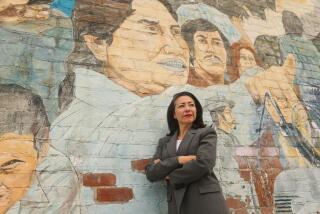Gorbachev Visit Was Her Summit
- Share via
Orange County’s unofficial delegate to the Reagan-Gorbachev summit in Washington returned to Santa Ana on Sunday, only to report that while the Soviets had acceded to her demands, U.S. leaders remained intractable.
The returning summiteer was 17-year-old Roselie Vasquez, a Saddleback High School senior who was one of 17 American students granted an audience last Thursday with the Soviet First Family of Mikhail S. and Raisa Gorbachev.
The Gorbachevs had welcomed the group’s request for a meeting, Vasquez said, but President Reagan had been less forthcoming.
“If we were able to meet with Mr. Gorbachev, (Reagan) would consider meeting with us,” Vasquez said White House aides told her. “But he left for Camp David before we were ready,” she said. “We only asked for five minutes, to acknowledge that he supported what we were doing.”
That disappointment notwithstanding, Roselie recalled her meeting with the Soviet leader as a highlight of her life. She was chosen for the journey by Future Leaders of America, a Latino youth group that was one of several organizations invited to select student leaders for the trip.
The youth groups sent Mrs. Gorbachev a videotape of American students speaking on behalf of peace and asked for the meeting when the Gorbachevs came to the United States.
The meeting depended on a break in the General Secretary’s tight schedule, though. It wasn’t until the day of the meeting that the students knew they would meet Gorbachev rather than lower-level Soviet officials.
“It was up in the air till the last minute as to who we were going to meet,” Roselie said.
The students, who arrived in Washington last Tuesday, had spent hours deciding upon questions for Gorbachev, on the hope that they would be able to have a group discussion with him.
“We wanted to ask questions that wouldn’t be asked by the reporters,” on such topics as educational exchanges between the superpowers. But “we were never able to ask a question,” she said.
When they finally met the General Secretary, however, the students found he had anticipated their queries, Roselie said, adding that he spoke in favor of exchange programs for young people and of the need for a greater degree of understanding between Soviet and American citizens.
Reaching Gorbachev had its hitches, however.
Roselie and her fellow students began their historic Thursday by riding the capital city’s subway into town. As they approached the Soviet Embassy, accompanied by their teachers and a Soviet official, the students ran into unexpected opposition.
“The American guards didn’t want to let us in,” she said. “They said they didn’t know what we were talking about.”
But a Soviet official assured the Americans that the students possessed the necessary clearances to enter the embassy, and the students walked down the red carpet into an embassy chamber.
There they found a gaggle of reporters, but no Gorbachevs, Roselie said. When the Gorbachevs entered unannounced, the American reporters--but not their Soviet counterparts--were ushered away, and the encounter began.
The General Secretary greeted each student individually, Roselie said. She said she was somewhat overwhelmed by the occasion and offered the Soviet leader a simple, if heartfelt, greeting: “Thank you so much for coming--we really appreciate it.”
Then Gorbachev, who spoke through a translator, asked the students, “What do you want to do?”
“We were sort of in awe,” Roselie said. So they let Gorbachev do the talking. “He thanked us for knocking on his door,” she said. “But then Mrs. Gorbachev interrupted and said, ‘our door.’ ”
The meeting with the Gorbachevs followed intensive study of the history and economics of the Soviet Union, said Gilbert Cuevas, a counselor at an Oxnard high school who accompanied the students. Cuevas founded Future Leaders of America and helped select the students for the trip.
Despite a meeting that the students viewed as an important symbol of international understanding, evidence of deeper fears among the older generation colored the students’ homecoming at Los Angeles International Airport.
Commenting on her study of the Soviet Union, Roselie said, “It hasn’t weakened our faith in the American system, but it’s opened our mind to some of the ideals of communism.”
Before she could elaborate, however, her elders cut her off, seeming fearful that her comments would be misconstrued as somehow favoring Marxism.
Thus hushed, she offered a more general explanation: “But we were by no means pro-communist. There are many cultures that are different from our own.”
More to Read
Sign up for Essential California
The most important California stories and recommendations in your inbox every morning.
You may occasionally receive promotional content from the Los Angeles Times.













